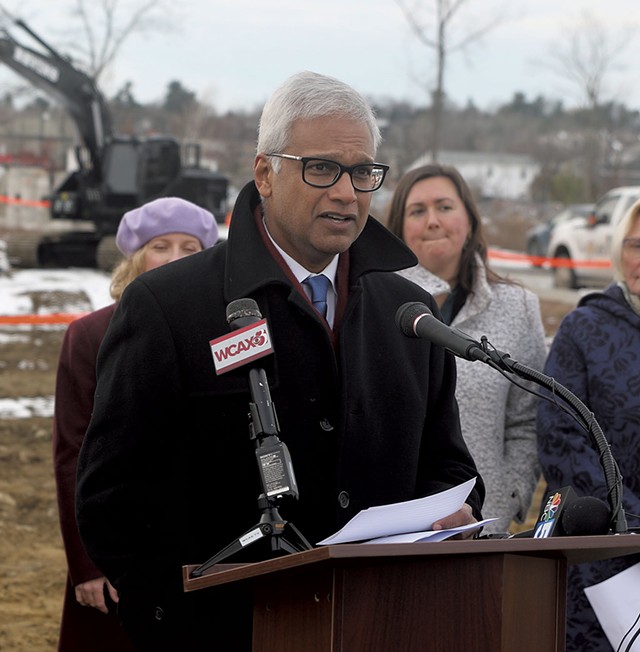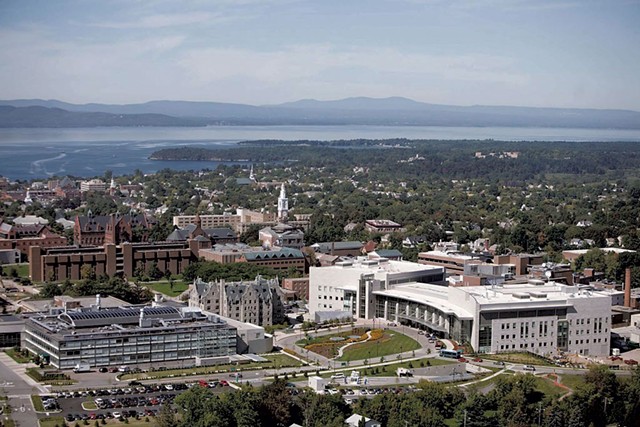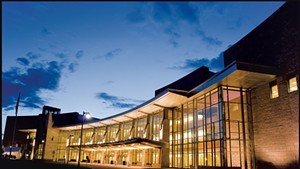
- Sean Metcalf
Tensions were already high last month during the annual review of the University of Vermont Medical Center's budget when state regulator Owen Foster launched into a pointed line of questioning.
The former federal prosecutor, in his first year chairing the Green Mountain Care Board, had just listened to hospital officials explain how improved billing practices would allow the hospital to get more money from Medicare moving forward.
Officials at the UVM Health Network, the umbrella organization that oversees the medical center, hoped to show the regulators that they were trying to reduce the hospital's reliance on private insurance companies, whose rising costs get passed down to patients.
But Foster had a different takeaway. To him, the hospital was acknowledging that it had been leaving tens of millions of federal dollars on the table for years. That's tough to stomach, he said, when many Vermonters can't afford their plans.
Foster's point seemed to puzzle Sunny Eappen, UVM Health Network's president and CEO, who himself was in his first Vermont budget cycle. Sure, Eappen said, if the issue had been remedied years ago, it would have saved Vermonters money. But to improve, the hospital will inevitably find things that it could have done better in the past.
When Foster pressed the matter, Eappen cut him off. The billing issue would have been caught by "good regulators," he said, frustrated. "I don't think our job here is to try to put blame on different people."
"It sounds like you just did," Foster shot back.

- File: Colin Flanders
- Dr. Sunny Eappen at a press conference in 2022
The tenor of the meeting caught the attention of the UVM Health Network's trustees, who, in a letter to lawmakers, accused the board of overstepping its authority and acting unprofessionally.
Last week, the regulators agreed to let the hospital take in an extra 7.6 percent in revenue next fiscal year, as it had requested. But they limited how much of that could come from insurance companies, approving only a 3.1 percent increase — far less than the hospital's ask of 10 percent. They placed similar limitations on six of the state's 13 other nonprofit hospitals.
UVM Health Network officials say they aren't sure yet what this means for their operations. But the cuts seem to show that regulators are willing to act aggressively to curb health care costs in coming years — even if that means clashing with Vermont's largest hospital.
Established in 2011 and charged with containing health care spending and advancing reform efforts, the five-member Green Mountain Care Board sets health insurance rates and approves budgets for all 14 of Vermont's nonprofit hospitals. Its governor-appointed members serve six-year terms, earn salaries well over $100,000 and hold some of the strongest oversight authority of any health care regulators in the country. But for all of their potential power, they must constantly balance two competing priorities: making sure patients have access to high-quality care and keeping costs low.
The tension between these two goals is most apparent during the board's review of the UVM Medical Center's budget, which is by far the largest in the state. Each year, hospital leaders submit their spending plans and warn that any concessions could affect patient care.
But a growing hospital budget inevitably leads to Vermonters paying higher health insurance premiums. As a result, patient advocates say, more people are signing up for cheaper, high-deductible plans that risk socking them with debt.
Critics say the care board has been too quick to give in to the hospital's demands in past years. Some even accuse it of being too cozy with the health network, noting that two former care board chairs, Anya Rader Wallack and Al Gobeille, went on to receive high-paying gigs with the UVM Health Network.
The network, meanwhile, says the board has been far too aggressive, even when its hospitals receive most of what they ask for.
Last year, regulators reluctantly allowed the UVM Medical Center to charge commercial insurance companies 15 percent more because officials said it would help the hospital regain its footing after the pandemic. The hospital had asked for 20 percent.
In response, then-network president John Brumsted blasted regulators for their "deep, arbitrary cuts." He said the reduction — $35 million out of a $1.9 billion budget — would deal a "severe blow" to the hospital's ability to treat patients.
A year later, the hospital's finances seem to have rebounded. When the new commercial rates went into effect in January, the hospital's operating margin immediately jumped back into the black, where it has remained ever since.
But the increase did have consequences for consumers. Nearly 2,000 Vermonters enrolled with the nation's largest insurer, UnitedHealthcare, almost lost their coverage at UVM Health Network hospitals earlier this year due to a contract dispute. United, which took in $14 billion in profits last fiscal year, blamed the health network's fast-rising prices, while UVM officials accused the insurance behemoth of lowballing them. The two sides agreed to a last-minute deal to extend coverage through the end of the year, but it's unclear whether they will reach a new agreement from there.
And now, the hospital says it's still on unstable financial ground. Executives pointed to recently negotiated contracts that include pay hikes for nurses, technical staff and resident physicians. The hospital is also investing in housing and childcare for employees, officials noted, while pursuing projects such as a new outpatient surgery center that should help reduce its well-documented backlogs for appointments and procedures.

- Courtesy Of University Of Vermont Medical Center
- University of Vermont Medical Center
Care board members weren't convinced. Last month, they grilled the officials about efficiency and questioned whether UVM's proposal would hurt consumers and independent medical practices.
They also referred to the plum salaries of network higher-ups, such as the $2 million that Brumsted made in his final year.
"I'm not trying to take away your money at all," Foster said. "I get it. You worked hard; you're top-notch people. But there's a lot of top-notch people working really hard to pay [for insurance], and it's hard for them to see that kind of number."
Two weeks after that meeting, UVM Health Network trustees sent lawmakers a letter accusing the care board of "micromanaging" hospital budgets.
It singled out the board's three newest members — Foster, Thom Walsh and David Murman, who were all appointed within the past two years — and accused them of making up their minds well before the review even began.
The board members used "rhetoric intended to demean our leaders, our boards and our employees," the letter reads. "They had done so by advancing their own opinions and perceptions of expertise rather than through thoughtful review of hospital submissions and data." The letter called on lawmakers to hold the board "accountable."
The missive struck some observers as an attempt to intimidate the care board, which was created by the legislature. "Otherwise, why would hospital board members protest to the Legislature before a decision is even rendered?" Bill Schubart, the former chair of Fletcher Allen Healthcare, the predecessor of UVM Medical Center, wrote in a column published on VTDigger.org over the weekend.
The letter prompted Rep. Lori Houghton (D-Essex Junction), who chairs the House Committee on Health Care, to review a recording of the August 23 meeting. She said nothing jumped out as problematic.
The care board's focus on affordability is precisely what the legislature intended for the body. "I think they provide a valuable piece of the system for health care in Vermont," she said of the regulators.
A network spokesperson declined to make any of the trustees available for an interview, saying it would be inappropriate for them to speak about the network's relationship with regulators before the care board publishes its official written decisions later this month.
The letter wasn't the only action the UVM Health Network took behind the scenes. It also demanded that Murman recuse himself from deliberations, alleging that he has a conflict of interest because he and his wife are doctors in the network. Murman, an emergency room physician at the Central Vermont Medical Center, is the only health professional on the care board.
Before the hearings, Murman consulted with the state ethics commission and decided to abstain from discussing his hospital's budget. He still planned to vote on the network's other two Vermont hospitals, though. In a disclosure, he noted that the network would likely claim he has a conflict because physicians get paid bonuses based on their employer's financial performance. He pledged to donate any extra pay to charity.
The network challenged him anyway, submitting a written recusal request a day before the August hearing. But because Murman would have had to respond in a formal hearing and the board was already on a tight timeline, he relented, recusing himself from votes on all three of the network's hospitals.
On September 13, the four remaining members unanimously backed the UVM Medical Center's slimmed-down rate increase. They also ordered the hospital to submit a plan for reducing costs and containing growth.
Explaining his vote, Walsh, an adjunct professor at the Dartmouth Institute for Health Policy and Clinical Practice and an experienced health care consultant, said hospitals under financial stress typically take several predictable steps. They cut administrative positions, dock executive pay and put off infrastructure projects, he said.
The medical center, on the other hand, has several new projects in the works and is becoming even more top-heavy. It's also trying to "intimidate the regulators," he said, "while saying that they'll be forced to cut services because their finances are in trouble."
Walsh compared the hospital's size and market power to being the only ice cream shop at the beach. If you can't make money in such an environment, "it's not the heavy hand of regulation that's the problem," he said. "It's the business model."














Comments
Comments are closed.
From 2014-2020, Seven Days allowed readers to comment on all stories posted on our website. While we've appreciated the suggestions and insights, right now Seven Days is prioritizing our core mission — producing high-quality, responsible local journalism — over moderating online debates between readers.
To criticize, correct or praise our reporting, please send us a letter to the editor or send us a tip. We’ll check it out and report the results.
Online comments may return when we have better tech tools for managing them. Thanks for reading.